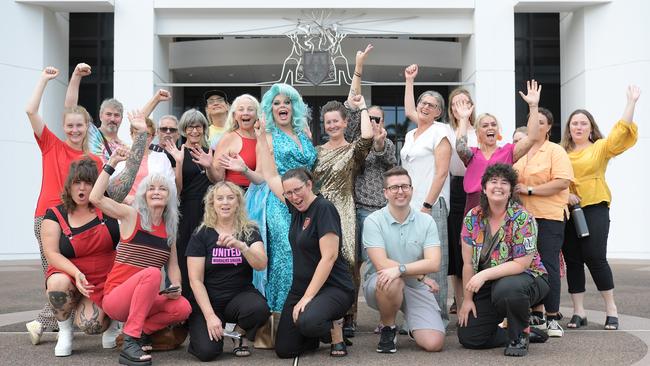Advocates are divided by landmark changes to the NT’s Anti-Discrimination Act
People across the Northern Territory have spoken out about landmark changes to anti-discrimination laws. Find out what has been said here.
Politics
Don't miss out on the headlines from Politics. Followed categories will be added to My News.
Territorians are divided over new laws passed by the Territory Government on Tuesday night.
Following lengthy debate and subsequent passing of the Anti-Discrimination Amendment Bill 2022, lobby groups, experts and individuals have spoken out.
Anti-Discrimination Commissioner Sally Seivers, whose decade-long term will end in January, said the changes provided both individual and systematic reform.
“The reforms are very welcome. They enable the Anti-Discrimination Commission to assist more people to resolve more matters that impact negatively in their lives, while at the same time working proactively to prevent discrimination,” she said.
The reforms have been heralded as “momentous” for Territory women as protection against sexual harassment is extended to “all areas of life’.

“While these reforms benefit the whole community, they are especially momentous for Territory women,” Darwin lawyer and equality advocate Caitlin Perry said.
“We experience among the highest rates of domestic, family and sexual violence in the nation.
“The safety of Territory women at work, in the home, when accessing services, and on the streets is now a central element of the legislative framework of the Northern Territory, we can all be very proud of this achievement”.
Charles Darwin University Associate Professor of Law Alan Berman said the most significant change would be the elimination of exemptions, section 37a, allowing religious educational institutions to discriminate against staff or students based on their sexuality or religious belief or activity.
“The elimination of exemptions for religious schools to discriminate against students and staff based on sexual orientation or gender identity will foster a more inclusive culture at these institutions and protect vulnerable members of the community from unfair treatment in the name of religion,” he said.
“As the Northern Territory moves to accept this bill, it also moves toward a more truly egalitarian society that protects the dignity and equality of all Territorians.”
However, the Australian Christian Lobby (ACL) maintained the government had “broken ranks” with its federal Labor counterpart, which is reviewing section 37a.
The commonwealth law allows faith-based schools to discriminate on the basis of sexual orientation or religion but all states and territories in Australia have their own anti-discrimination laws to provide local protections.
“The NT government has broken ranks with the federal Labor government, revealing a biased and hostile attitude against people of faith,” ACL national director of politics Wendy Francis said.
“The NT bill forces religious schools to hire staff who do not adhere to the school’s beliefs.”
Rainbow Territory spokesman Ahmad Syahir Mohd Soffi said the passing of the bill meant LGBTQI+ Territorians employed in religious schools would be able to go to work knowing that they could no longer be discriminated against.
“Everyone deserves to live free of discrimination,” Dr Soffi said.
“This legislation means that no workplace, including religious schools and organisations, can discriminate against LGBTQI+ Territorians.”
Dr Soffi thanked advocates and allies who fought for equal legal rights for more than 30 years.
“Their commitment laid the groundwork for today’s significant advancement for LGBTQI+ Territorians,” Dr Soffi said.
Another key reform included the replacement of “infectious disease” in the act with “HIV and hepatitis”.

Northern Territory Aids and Hepatitis Council executive director Genevieve Dally said the inclusion of HIV and hepatitis status as protected attributes could finally begin to address the impacts of systemic stigma and discrimination.
“This legislation can set a powerful precedent that is able to be replicated across the country,” she said.
Chief Minister Natasha Fyles told parliament the changes were a necessary step to protect vulnerable Territorians but the message had been lost in the Opposition’s tactics.
“The Attorney-General and the previous attorney-general and all of this team have been out there having difficult conversations with members of communities, talking to our churches, and churches protect some of the most vulnerable in our community,” Ms Fyles said.
“They want to see progressive legislation and I’ve had those personal conversations with them. We are not attacking religious groups.”
Opposition leader Lia Finocchiaro said while some important commonsense protections were contained in the bill, Labor had sacrificed freedom of speech and freedom of religion in the process.
“The attacks on freedom are out of step with most Territorians, who assume those freedoms are inalienable rights,” she said.




